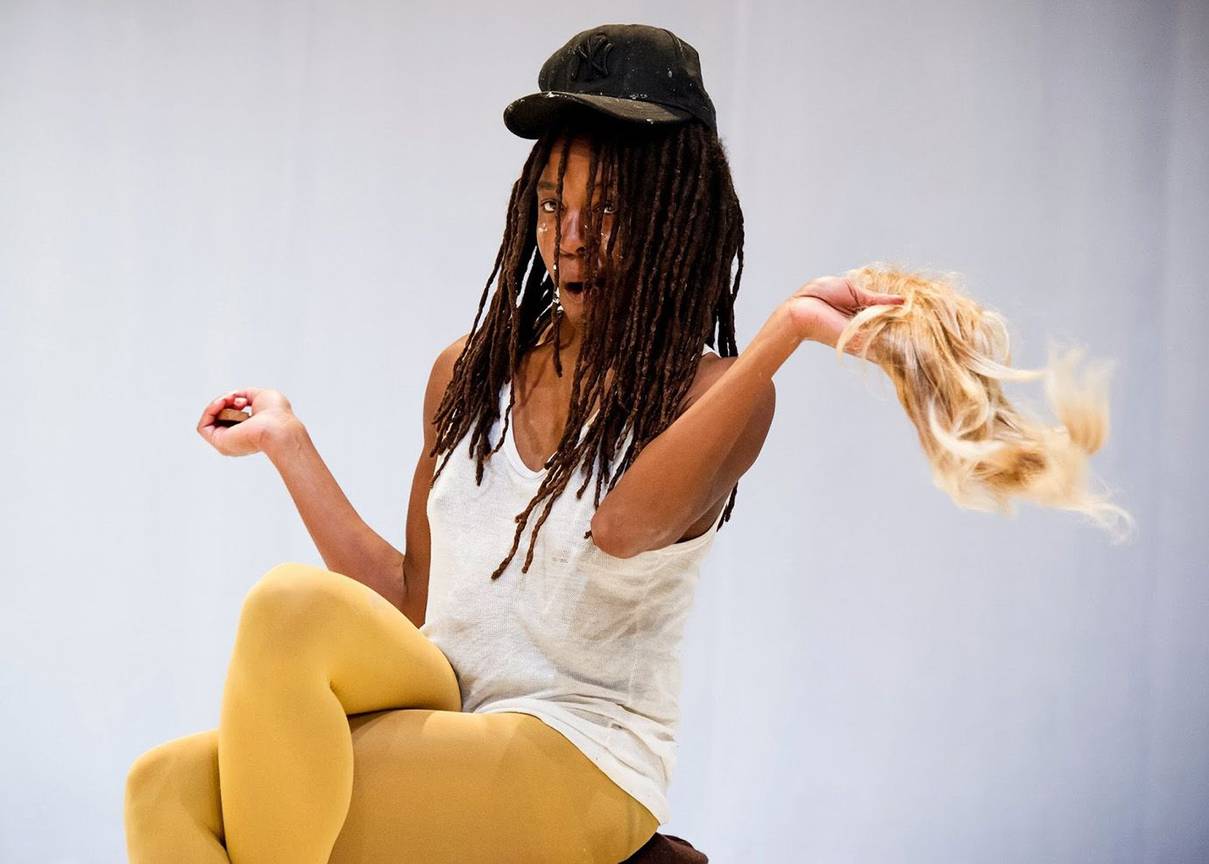The Beursschouwburg has previously staged Canadian performer Dana Michel’s very personal work Mercurial George. It is now presenting her previous solo Yellow Towel as part of its The Future Is Feminist programme. We spoke to Dana Michel about blond hair and black humour.

Performance artist Dana Michel brings solo show to Beursschouwburg
As a child, Dana Michel wrapped a yellow towel around her head in an attempt to look like the blond girls at school. In her solo performance Yellow Towel, she digs further into the inner world of the person she was back then and who she is now, but she also refuses to be anything other than herself from now on.
At the origins of the work, which The New York Times called one of the most remarkable productions of 2014, was a workshop with performance artist and former Kaaitheater resident Ivo Dimchev. “The first bit of Yellow Towel originated from a workshop with him in Vienna,” explains Dana Michel. “Six months before, I had discovered his work online, through a friend of mine who showed me a video. When I saw it I thought: ‘Hey, that is my long lost brother!’ Ivo helped me to find the inner permission to go off onto the tangent that I needed to start working.”
How did he do that?
Dana Michel: The most important thing was that during his workshop he told me to use my voice for the first time. The second thing was that I witnessed his direct use of humour. Those things changed my working process completely. They also loosened the way that I use my body, and the subject matter. I used to have a very dogmatic approach to choreography.
But a big part of my personality has always been my jokiness, my talking, and my way of playing with language. So when I opened my mouth for the first time onstage, it felt as though the 70 percent of myself that I had always shut out, could also be incorporated in my work.
Maybe you refrained from literally using your own voice onstage because it is a very idiosyncratic one.
Michel: It feels like talking to myself, yes. There is of course text and there are things I really want to say, but it is almost as if those things become a portal to go to different places very far from and very close to me. Sometimes the words also serve as a soundscape. So the language has many uses, and what keeps the work interesting for me is that it switches all the time. It looks rigid at times, but I don’t have complete mastery over it, which keeps the work very much alive.
I wanted to make something that would allow me to be myself on stage at all moments. So if I am feeling shy and awkward, I use that as subject matter, and I don’t have to deny the fact that I am nervous and shy. It feeds the physicality and the way that I speak. Actually I am just reflecting my mental and physical state.
A bit like performing in front of the bathroom mirror.
Michel: Kind of. I am a very sensitive and reactive person, so if I were to trip over a big stone walking down the street, and there would be no one else on the planet, I would probably scream and shout very loud. But we are obviously socialized in a way that makes us minimize our reaction to tripping over the stone, to keep on walking, and to erase the whole thing. In this work, I do not erase anything. I remove the social filter.
Is that why people connect to the work? Because they witness the freedom you allow yourself on stage?
Michel: I think so. That is a pretty simple way of putting it.
And what about the perception of the humour. I guess some people also take the work very seriously.
Michel: Exactly. There are audiences that laugh, audiences that are dead silent, and audiences with people who laugh while others give them dirty looks for laughing. And it all makes sense because I am going through these stages as well. I think that what I have made is a black humour performance. There is always comedy going on, but of course comedy can be extremely sad.
Like in your “ridiculous poem” “Yellow Towel”, one of the piece’s sources.
Michel: I called it a ridiculous poem because I pour words like “ridiculous” over everything that I do like ketchup. It is an attempt to remove the sacredness of it. I wrote the poem during Ivo’s workshop because he wanted us to reflect on our autobiographies. I did it in ten minutes and named it after the yellow towel that I used to put on my head when I was little, to pretend I had long blond hair.
Which makes race one of the themes of the work.
Michel: There are different centres of interest, but one definitely was to give myself the permission to talk about my race. I decided that I was going to make black art, although I didn’t know what that would mean or what that was going to look like.
And does the work also fit in the programme of The Future Is Feminist?
Michel: I am an undeclared feminist like I am undeclared in everything in order to retain my freedom. But me and my work absolutely resonate with the feminist theme, and it is a pleasure to have the work included in the programme and thus framed in a different register.
> Dana Michel: Yellow Towel. 27/10 & 28/10, 20.30, Beursschouwburg, Brussels
Read more about: Podium
Fijn dat je wil reageren. Wie reageert, gaat akkoord met onze huisregels. Hoe reageren via Disqus? Een woordje uitleg.